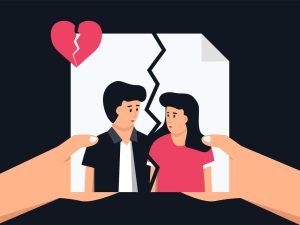I. Introduction

Navigating the emotional landscape of a romantic breakup can be one of life’s most challenging experiences, invoking a profound sense of grief and loss that is often difficult to articulate. This emotional turmoil frequently encompasses a broad spectrum of feelings that range from deep sadness and intense anger to pervasive confusion, which all reflect the deep attachment that individuals once shared with their partner. As people grapple with and attempt to process these tumultuous feelings, understanding the psychology of grief becomes not only essential but also transformative. Psychological resilience, for instance, emerges as a critical factor in determining how individuals respond to such adversity and the manner in which they cope with the pain of separation, as highlighted by (Allison S Troy et al., 2022). The journey to recovery is seldom straightforward; it often involves not just mourning the relationship that has ended but also actively fostering personal growth and self-discovery in the aftermath of loss. Additionally, the experiences of those who have endured various forms of trauma, such as intimate partner violence, can provide vital insights into the potential for post-traumatic growth. This emphasizes the crucial role of supportive environments and relationships in promoting healing and resilience, as noted in (Hulda S Bryngeirsdottir et al., 2022). Ultimately, the process of moving forward can lead individuals to a deeper understanding of themselves and their emotional needs, paving the way for healthier relationships in the future while reflecting on the lessons learned from past experiences
Please also review AIHCP’s Grief Counseling Courses to learn more about grief and loss.
A. Definition of grief and loss in the context of romantic relationships
Grief and loss in the context of romantic relationships encompass a complex array of emotional responses, often elicited by the dissolution of a significant partnership. This grief, which can be as profound as that experienced in the face of death, involves not only the loss of the partner but also the future envisioned with them, including shared dreams, plans, and memories that were built together. The emotional impact can be quite far-reaching, affecting various aspects of one’s life and deepening the sense of emptiness and absence left behind. Interestingly, initiators of breakups, contrary to common assumptions, frequently experience significant grief, with their feelings often feeling disenfranchised due to societal perceptions that label them as the decision-makers who have caused the separation (Finkelstein et al., 2014). This misunderstood experience can lead to emotional turmoil, causing a tumultuous inner conflict that may not easily be recognized or validated by others. The result can be detrimental, considerably impacting mental health and overall well-being as individuals grapple with feelings of guilt, loss, and unresolved love. Additionally, factors such as past trauma and coping strategies can further complicate the grief process in individuals, suggesting a link between previous losses and emotional responses to romantic separation (Golden et al., 2017). These underlying issues may exacerbate feelings of isolation and despair, making it vital for individuals to seek support. Therefore, recognizing the multifaceted nature of grief in relationships is essential for navigating the healing journey following a breakup, as understanding these complexities can lead to healthier coping mechanisms and emotional resilience in the aftermath of loss.
B. Importance of addressing emotional pain after a breakup
Dealing with the hurt after a breakup is vital for personal healing and growth. Often, the sadness you feel when a relationship ends can be a lot like the grief many experience when they lose someone to death (Dahlstrom et al., 1994). When you take time to face that emotional storm, you might end up rethinking your past connections and even form healthier bonds later. Some recent research suggests that, generally speaking, people sometimes lean on online dating apps during these rough patches—they use them to spark new connections, boost their self-esteem, or just distract themselves from the lingering pain (Kural et al., 2024). At times, these apps can be a double-edged sword; while they might ease loneliness, they can also potentially derail your recovery if you’re not careful. All in all, confronting that emotional pain, however messy it might feel, remains a key step in working through the aftermath of a breakup.
C. Overview of strategies for healing and moving on
Bouncing back from a breakup isn’t just about healing a broken heart—it’s about wading through a whole mix of feelings, thoughts, and social shifts. Often, simply speaking about what’s on your mind can help ease that heavy load (studies show that it tends to dial down the distress somewhat (Moreno et al., 2019)). Sometimes, finding a counselor to chat with provides a sort of private haven where you can untangle those gnarly emotions—especially when betrayal or infidelity leaves you reeling with hurt (DeGroot et al., 2014). You might be surprised that leaning on friends, family, or even a casually assembled support group can offer a warm sense of belonging and validation, even if it feels a bit awkward at first. And really, talking about what lies ahead—the dreams, the hopes, the future plans—can gently steer you away from the past and give you a boost of resilience for the long haul.
II. Understanding Grief and Loss
Understanding grief and loss extends beyond the emotional turmoil experienced following a breakup; it encompasses the nuanced reactions of both partners involved. The complexity of grief in these situations can often be underestimated, particularly regarding how each individual processes the ending of a significant relationship. Research indicates that initiators of breakups often face grief that is overlooked or dismissed, suggesting that their emotional experiences deserve greater recognition and validation. This often leads to a sense of isolation, as those who initiate a breakup may struggle with feelings of guilt or regret, complicating their grief further. A study involving young adult initiators revealed that their grief, frequently disenfranchised, is accompanied by a desire for support from peers and family during this transformative period (Finkelstein et al., 2014). The longing for solace and understanding during a time of loss is pivotal, as it not only aids in emotional healing but also encourages open discussions about the bittersweet aspects of their decisions. Furthermore, the attachment styles of individuals play a significant role in shaping their responses to breakup distress, ultimately influencing their capacity for personal growth and relationship dynamics in the future. Those exhibiting attachment anxiety may find that their heightened emotional experiences trigger a deeper cognitive processing of their loss, facilitating personal development, whereas avoidant individuals may hinder their growth by suppressing their feelings and avoiding confrontation with their emotional state (B Kleim et al., 2013). Through this lens, one can see that an understanding of grief and loss within romantic contexts necessitates a comprehensive acknowledgment of these divergent experiences, highlighting how each person’s journey through heartache can vary widely and warrant unique approaches to healing and support.
A. The stages of grief as they relate to romantic loss
The stages of grief, as articulated by Kübler-Ross, offer a poignant framework for understanding the emotional turmoil experienced during romantic loss. This process often begins with denial, where individuals may struggle to accept the reality of their breakup, leading to a profound sense of confusion and numbness that can leave them paralyzed in their emotions. As the reality sets in, anger can emerge, causing individuals to direct their frustrations either inwardly, generating feelings of guilt and self-blame, or toward their ex-partner, manifesting in outbursts of rage and resentment. Eventually, bargaining may take place, as the grieving individual seeks to negotiate a return to the former relationship, often replaying past events in their minds and contemplating what they might have done differently to alter the outcome. However, it is crucial to recognize that initiators of breakups also experience significant grief, a phenomenon that is frequently overlooked and thus undiscussed. Research indicates that this grief can be just as impactful, often disenfranchised, highlighting how people may struggle silently with their emotions, feeling unsupported or judged. This underscores the importance of fostering open conversations and providing essential support from friends and family during this challenging time (Finkelstein et al., 2014). Further, as individuals navigate through grief, healing and personal growth can often follow if there is a willingness to engage in self-reflection and embrace change, suggesting that these experiences, while painful and disorienting, can ultimately foster resilience and a deeper understanding of oneself and relationships (Dahlstrom et al., 1994). Recognizing these stages is important, as embracing them can facilitate a healthier pathway to recovery and emotional well-being.
B. Emotional responses to the end of a relationship

The emotional responses to the end of a romantic relationship are intricate and multifaceted, often encompassing a broad array of feelings such as grief, loss, and personal growth. Individuals who find themselves navigating the tumultuous waters of a breakup may experience heightened distress, particularly those who possess an anxious attachment style. This heightened emotional state, while painful, can paradoxically serve as a crucial impetus for significant personal development and introspection. Research suggests that such distress may act as a catalyst for in-depth cognitive processing of breakup-related emotions, ultimately fostering personal growth and self-discovery, even amidst the considerable pain endured (B Kleim et al., 2013). On the other hand, individuals with an avoidant attachment style may face a different set of challenges, often grappling with suppressed distress that inhibits their ability to reflect on their emotions and foster growth. This suppression complicates their emotional landscape in the aftermath of a breakup, potentially prolonging their suffering. Additionally, it is important to recognize that those who initiate breakups also endure a form of grief, despite common societal perceptions that tend to diminish their emotional pain. Studies indicate that these individuals deeply value their support systems and frequently encounter what is known as disenfranchised grief, suggesting that their feelings are indeed valid and worthy of acknowledgment and exploration (Finkelstein et al., 2014). This complex interplay of emotions underscores the critical importance of both understanding and actively processing the grief that follows a breakup, as it can be instrumental in achieving closure and emotional healing.
C. The impact of loss on mental and physical health
Losing a major romantic bond throws both the mind and body off balance. When a breakup happens—especially during those early, vulnerable adult years—the mix of grief and stress tends to pile up, messing with everyday routines (Reimer et al., 2019). Sometimes, that feeling of isolation gets even worse, and it can seem like society just shrugs off your pain; many call this disenfranchised grief, where the hurt you feel is barely acknowledged. As sadness deepens, research generally shows that our bodies react too, with things like a faster heart rate and sleep that goes a bit haywire (SHAPIRO et al., 2024). In most cases, giving a proper nod to this kind of loss—even if it feels a bit rough around the edges—opens up better ways of coping, which over time can lead to improved mental and physical well-being.
III. Coping Mechanisms for Dealing with Grief

When a romantic relationship ends, the pain that follows can feel like an overwhelming mix of emotions that’s tough to untangle. In most cases, dealing with that sorrow means finding more than one way to handle the inner storm—it isn’t as simple as brushing it off. Some studies even hint that getting a grip on the different ways grief shows up might help; for example, Schneider laid out a kind of three-part idea: one part is about what’s missing (that deep sadness), another part focuses on what remains (the slow path of healing), and the last bit considers what might be ahead (the hope of growth) (Dahlstrom et al., 1994). This perspective seems to suggest that by facing your grief head-on, you open up a route toward recovery—even if the progress isn’t perfectly straight. You might lean on family and friends, try out professional counseling, or join a group where others share the same struggles—especially when the pain of betrayal or a breakup leaves you a bit off-kilter (DeGroot et al., 2014). Ultimately, these methods can help build resilience, letting you slowly come through the hurt with a refreshed sense of who you are, even if the journey feels a little uneven at times.
A. Healthy ways to express emotions (journaling, talking to friends)
Losing a former romantic partner can leave you feeling swamped by grief. Finding ways to cope is key, and sometimes that means jotting notes in a personal journal or simply chatting with friends who understand. Writing down your thoughts lets you untangle a bunch of complicated feelings—it’s like facing those lingering issues head-on, even if the process feels a bit raw sometimes. Meanwhile, talking with a friend can make a big difference; casual, honest conversations help break the feeling of isolation and remind you that sharing what’s inside matters. Research generally suggests that having good communication skills plays a huge role in overcoming such losses, hinting that these everyday methods can really bolster your emotional strength (Booth et al., 2008), (Rose et al., 2015). In the end, whether it’s through writing or just talking it out, letting yourself open up might spark unexpected personal growth and eventually lead to recovery.
B. The role of self-care in the healing process
When big losses hit—like ending a romantic relationship—taking care of yourself suddenly feels absolutely essential. Spending time on self-care, whether it’s focusing on your physical strength or calming your mind, helps ease grief and builds the kind of resilience needed to get back on your feet. Indigenous views, for example, remind us that well-being isn’t just about mental illness; it’s about staying connected to our own feelings and the community around us (Shepherd C et al.). You can also see this idea at play with athletes, who, in most cases, find that engaging their mental skills while recovering from injuries nudges them toward real, positive growth (Riordan et al., 2014). In the end, mixing different self-care approaches—from a bit of exercise to moments of quiet mindfulness—can seriously boost your ability to work through grief and open the door to emotional recovery.
C. Seeking professional help: therapy and support groups
Breakups can hit hard, leaving you swamped with a jumble of grief and loss that’s really tough to manage. Therapy might offer some relief – it gives you not only practical tools to sort through your feelings but also a quiet spot where you can untangle a messy mix of emotions. Sometimes, in one session you might suddenly face a surge of loneliness or that nagging emptiness that pops up when you’re feeling most vulnerable. Support groups, on the flip side, often end up wedded in a way that knits people together through their shared struggle, easing that crushing sense of isolation. This kind of community support is especially key when those heavier, existential questions start surfacing, much like what’s noted in literature on terminal illnesses and their impact on emotional well-being (Johnson et al., 2016). In most cases, having professional guidance really boosts your coping strategies and paves a path toward healing in a structured, yet compassionate, way (Jennings B et al., 2003).
IV. Moving On After a Breakup

Transitioning from a relationship can often evoke complex emotional responses that significantly impact one’s mental health and overall well-being. The phenomenon of breakup distress is frequently exacerbated by anxious attachment styles, which can lead to increased rumination and a deep longing for the former partner. This preoccupation ultimately hinders the healing process and prolongs the emotional turmoil that often accompanies such a significant life change (de Jong et al., 2022). This repeated fixation on the relationship can manifest in various detrimental behaviors, such as withdrawing from social interactions or engaging in negative self-talk, which impede personal growth and emotional recovery. It is crucial to recognize that individuals who initiate breakups often grapple with their own feelings of grief and turmoil. This reality is frequently overlooked by societal norms that tend to validate the pain experienced by those who are left rather than acknowledging the emotional struggle of those who initiate the dissolution (Finkelstein et al., 2014). The complexity of these feelings can lead to confusion and self-doubt, making it even more challenging to find closure. To successfully move on, individuals must navigate these emotional layers with care and intention, recognizing the importance of seeking support from friends and family. It may also involve developing healthier coping mechanisms that promote resilience, self-reflection, and a recommitment to personal goals and aspirations in the aftermath of loss. Engaging in mindfulness practices, pursuing new hobbies, or even speaking with a therapist can aid in this transformative journey, fostering a sense of renewal and hope for the future.
A. The importance of closure and letting go
The journey toward closure and the act of letting go are essential components in overcoming the emotional turmoil stemming from a breakup. Closure facilitates a sense of finality, allowing individuals to process their loss and initiate the healing process. It is a vital step that encourages introspection, helping each person confront their emotions and understand the lessons learned from the relationship. The significance of rituals—whether in the physical or digital realm—cannot be understated in this context, as they serve as tangible expressions of the internal emotional shifts that occur. For instance, while traditional rituals may provide a cathartic release through the disposal of tangible items like letters or gifts, recent studies indicate that digital possessions can complicate the grieving process, serving as persistent reminders of past relationships that linger in one’s online presence long after the romance has ended (Sas et al., 2016). The permanence of these digital artifacts necessitates new strategies for emotional release, emphasizing a pressing need for innovative approaches to rituals of letting go that resonate with our increasingly digital lives. Moreover, the realm of emotional expression found in media, such as video games and interactive storytelling, has been explored as a powerful means of confronting grief, demonstrating how immersive and interactive experiences can validate personal feelings, encourage emotional processing, and ultimately foster closure in ways that traditional methods may not. These contemporary methods of engagement provide an avenue for individuals to explore their inner emotional landscape more deeply, paving the way for healing and personal growth in a transformative journey toward moving forward (Harrer et al., 2019).
B. Strategies for rebuilding self-esteem and identity
Rebuilding self-esteem and identity after the loss of a romantic partner is a crucial aspect of the healing process and should be approached with intention and care. As individuals navigate their grief, it becomes imperative to engage in meaningful self-reflection and to take the time to recognize personal strengths and qualities that may have become overshadowed or neglected during the course of the relationship. This endeavor often involves the important steps of setting new, achievable goals or exploring new hobbies and interests that can foster a renewed sense of purpose and direction in life. (Dahlstrom et al., 1994) suggests that the experience of loss is not merely a moment of grief but also presents a valuable opportunity for significant growth, emphasizing the importance of engaging in activities that promote self-discovery and a deeper understanding of oneself. Additionally, the essential support from friends and family can significantly facilitate this transformative journey, providing much-needed validation, companionship, and encouragement throughout the recovery process. Moreover, establishing healthy coping strategies that could include practices such as mindfulness, meditation, and journaling allows individuals to process their emotions more effectively. By actively working through these feelings, individuals can begin to reconstruct their self-identity as distinctly separate from their former partner, fostering resilience and independence. Engaging in community activities or support groups can also further enhance this process, allowing individuals to rebuild connections with others and cultivate a strong support network. (Finkelstein et al., 2014).
C. Exploring new relationships and the timing of moving forward
Navigating the process of initiating new relationships after a significant breakup can be particularly challenging, as individuals often grapple with the remnants of grief associated with their past. The timing of moving forward plays a crucial role in this transition, with many individuals striving to balance their desire for companionship against the emotional landscape they still inhabit, which may be fraught with unresolved feelings and lingering attachments. As such, it is essential to acknowledge that the experience of grief is not always linear; past research indicates that individuals may encounter disenfranchised grief, where their mourning process remains unacknowledged by society, complicating their ability to form new attachments and sometimes leading to social isolation and confusion about their emotions (Barney et al., 2020). Furthermore, the initiators of breakups often experience their own unique brand of grief that can significantly influence their readiness to pursue new relationships, as they navigate feelings of guilt, regret, or relief that come from ending a significant chapter in their lives (Finkelstein et al., 2014). This complexity underscores the necessity for individuals to engage in profound self-reflection and to ensure they are adequately healing before venturing into new romantic territories. Such thorough self-assessment allows for the possibility of entering new relationships with a clearer mind and a more open heart, ultimately increasing the chances of forming healthier and more fulfilling connections. Balancing emotional readiness with the excitement of new possibilities can lead to growth that not only honors past experiences but also paves the way for a more hopeful future.
V. Conclusion

In concluding the exploration of grief and loss associated with the end of a romantic relationship, it becomes evident that the path to recovery is multifaceted and deeply personal. Each individual confronts their emotions—ranging from profound sadness to self-blame—differently, as reflected in the experiences shared by participants who navigated their breakups within the last two years (Benjamin A Hine et al., 2025). This individuality underscores the fact that there is no singular method for healing; rather, it is a journey that varies in duration and intensity based on each person’s unique circumstances and emotional landscape. Moreover, it is crucial to acknowledge that ongoing challenges, such as post-separation abuse encountered by many, can complicate the healing process (Benjamin A Hine et al., 2025). These complex emotional and situational dynamics often present formidable obstacles, making recovery feel even more daunting. However, embracing these difficulties as opportunities for personal growth can lead to enhanced resilience and a greater appreciation for life, underscoring the potential for post-traumatic growth (PTG) following the dissolution of relationships (S Subramaniam S et al., 2024). Engaging with and processing pain can foster a deeper understanding of oneself and one’s desires, paving the way toward healthier future relationships. Ultimately, recognizing the interplay between grief, loss, and self-discovery equips individuals to emerge from heartbreak not only healed but also transformed. This transformation is often characterized by newfound strength and clarity, allowing individuals to build more meaningful connections while nurturing a stronger sense of self. In this way, the experience of loss, though harrowing, can serve as a critical catalyst for personal evolution.
Please also review AIHCP’s Grief Counseling Certification Program and see if it meets your academic and professional goals. The program is online and independent study and open to qualified professionals seeking a four year certification in Grief Counseling.
Please also review AIHCP’s blog on why partners cheat. Click here
A. Recap of the importance of processing grief and loss
Dealing with grief and loss after a breakup is a wild ride—not just the heartache of losing someone, but also the unexpected burden on those who call the shots and end things. Research in most cases hints that starting a breakup comes with its own overlooked kind of sorrow; some even call it disenfranchised grief, a kind of emotional chaos that we’re often too busy to notice. It’s a reminder that facing your true feelings, messy as they might be, is pretty important. Friends and family, for instance, play a huge role in smoothing these rough patches (Finkelstein et al., 2014). Interestingly, the way you look back on past relationships can really shape your recovery; sometimes, dwelling on negative memories surprisingly helps you adjust better than clinging to overly positive recollections (Brenner et al., 2015). All in all, getting a grip on the ups and downs of processing grief and loss is key when you’re trying to move forward from what was once a close connection.
B. Encouragement to embrace the healing journey
Heartbreak sometimes feels like wading through an unpredictable storm—you never know when the next wave will catch you off guard, yet facing it head-on is often the first step toward regaining your balance and sense of self. People dealing with the layered pain of loss—especially that overlooked kind after a breakup—again, generally need to trust their feelings even if society often seems to dismiss them (Moreno et al., 2019). Reflecting quietly or chatting with a therapist can open unexpected doors to understanding, letting a slow, uneven conversation help release some of that burden. You can see this in characters like Joni in Joni Goes Postal, whose raw mix of anger and betrayal sparks a search for meaning in her life (Wannan et al., 2017). Allowing yourself to work through these tangled emotions, even if it happens in spurts, can turn deep loss into a real chance for personal growth and, eventually, a fresh start.
C. Final thoughts on personal growth after a breakup
After a breakup, things can feel rough yet oddly open the door to unexpected change. Sometimes the lingering pain—what many simply call heartbreak—hits hard with a deep sense of loss that can feel both overwhelming and a bit disconnected (Moreno et al., 2019). Taking a pause to reflect, however, can spark a subtle shift in perspective. In most cases, research suggests that folks who dare to explore “what’s possible” often see more personal growth after they’ve worked through their grief (Dahlstrom et al., 1994). This process nudges you to look inward, rethinking old values and desires while slowly building a keener sense of self and resilience. By hanging on to the lessons hidden in the hurt, many eventually find themselves stepping forward with a renewed strength, ready to nurture healthier bonds down the line. Essentially, the end of a romantic partnership isn’t just a final chapter—it can also be the messy, imperfect start of something new and profoundly enriching.
References:
- Dahlstrom, Charles J. (1994). Response to the Loss of a Romantic Relationship: Differences by Time Since the Loss, Gender, and Attachment Style.
- Moreno, Isibel C. (2019). Marriage and Family Therapists’ Clinical Impressions of Romantic Relationship Dissolution Heartbreak: A Modified Delphi Study.
- Finkelstein, Laura P. (2014). Breaking Your Own Heart: A Qualitative Study of Grief After Initiating a Breakup.
- B Kleim, C Hazan, C Saffrey, CP Fagundes, D Davis, D Proffitt, DA Sbarra, et al. (2013). Attachment styles and personal growth following romantic breakups: The mediating roles of distress, rumination, and tendency to rebound.
- Allison S. Troy, Emily C Willroth, Amanda J. Shallcross, Nicole R. Giuliani, James J. Gross, Iris B. Mauss (2022). Psychological Resilience: An Affect-Regulation Framework. Volume(74), 547-576. Annual Review of Psychology. https://doi.org/10.1146/annurev-psych-020122-041854
- DeGroot, Melinda M. (2014). The Betrayed Partner’s Experiences with Grief and Loss Following the Discovery of an Extramarital Affair. https://core.ac.uk/download/217158622.pdf











